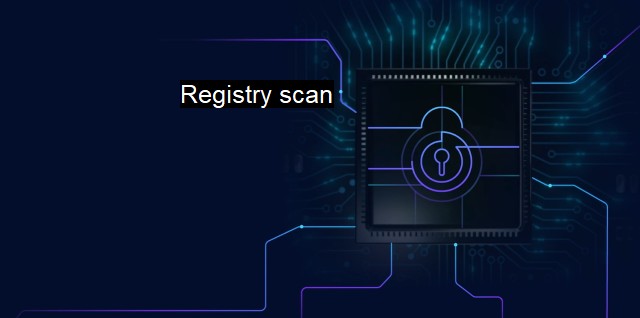What is Registry scan?
Registry Scan: Protecting Your Computer from Cybersecurity Threats and Maximizing Performance
Registry scanning refers to the process in which security software systematically checks the Windows registry of a computer. In the field of cybersecurity and anti-virus protection, understanding the concept of a registry scan is crucial. The Windows Registry manages many significant components of an operating system, including hardware, software, and user settings. Thus, any error or malicious modification in the registry can potentially cause serious damage to a user's system.Numerous types of malware, including spyware, adware, Trojans, and viruses, use the registry to embed their malicious code. These pieces of harmful software manipulate the Windows Registry to start their processes automatically every time the operating system reboots. Consequently, conducting regular registry scans becomes an essential aspect of an intensive cybersecurity strategy intended for Windows-based machines.
A malware scan is specifically designed for locating and removing malware infections. In contrast, a registry scan specializes in identifying irregularities and corruptions within the registry that could lead to security vulnerabilities or system stability issues. Therefore, registry scanning contributes to the overall health and security of a computer, complementing the protection mechanisms provided by anti-virus software.
Advanced anti-virus software incorporates registry scanning as part of its comprehensive threat detection techniques. The software scans the registry for any unknown or malicious alterations. This includes suspicious entries made by malware that signify their continual operation. Once these undesirable entries are discovered, the anti-virus software takes corrective actions like repair, quarantine, or deletion.
The registry scanning process also works diligently to optimize system performance. The large number of entries in the Windows Registry, varying from essential system settings to temporary data or leftovers from uninstalled software, can become bloated and cumbersome over time. Hence, a registry cleaner as a part of registry scan removes this needless data, leaving the registry streamlined and efficient, thus leading to enhanced system performance.
Another point to remember about registry scanning is the notion of a 'false positive.' Often, legitimate but uncommon entries in the system's registry may be incorrectly marked as potentially harmful by an antivirus system. Therefore, users are encouraged not to overwrite or delete any registry entries unless they are certainly malicious, as these modifications can result in unexpected system errors and crashes.
Using industry-recommended tools is advisable while conducting registry scans. These tools are designed by experts to ensure that the scanning process upholds a high level of accuracy and performance. Remember that not all registry issues necessarily point to a virus infection. Heavy use of the system, poor maintenance, and software conflicts can also contribute to registry errors.
It is pertinent to perform backups before conducting a registry scan because this process could potentially edit important registry entries. The backed-up version of the registry can save the day if a mistake arises during the registry scan and repair process.
Registry scanning is a pivotal element in cybersecurity and antivirus protection. It identifies and rectifies under-the-hood issues within the Windows Registry that could compromise system security and performance. Properly conducted, a registry scan can rid a system of hidden security threats, correct anomalies, and boost overall computer performance. Like many maintenance procedures, it is often as preventive as it is curative.

Registry scan FAQs
What is a registry scan?
A registry scan is a type of cybersecurity and antivirus scan that checks the Windows registry for any errors, corrupt entries, or malicious items that could potentially harm the system.Why is a registry scan important?
A registry scan is important because the Windows registry is a vital component of the operating system that contains important information about installed software, system settings, and user preferences. Any issues with the registry can cause system instability, crashes, and even data loss.How does a registry scan work?
A registry scan works by accessing and analyzing the Windows registry using specialized software. The software examines each registry entry and compares it against a database of legitimate entries to determine if anything is out of place or potentially dangerous. If any issues are found, the software will provide options for repairing or removing the problematic entries.Can a registry scan fix all my cybersecurity and antivirus issues?
No, a registry scan is just one component of a comprehensive cybersecurity and antivirus strategy. While it can detect and repair issues with the Windows registry, it may not catch all types of malware or cybersecurity threats. It's important to use additional security measures such as antivirus software, firewalls, and safe browsing practices to ensure maximum protection.| | A | | | B | | | C | | | D | | | E | | | F | | | G | | | H | | | I | | | J | | | K | | | L | | | M | |
| | N | | | O | | | P | | | Q | | | R | | | S | | | T | | | U | | | V | | | W | | | X | | | Y | | | Z | |
| | 1 | | | 2 | | | 3 | | | 4 | | | 7 | | | 8 | | |||||||